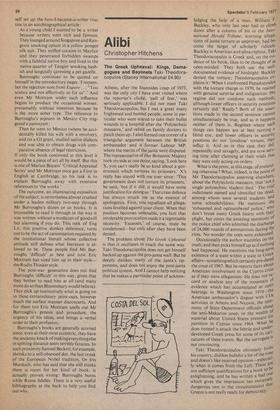self set up the how-l-became-a-writer routine in an autobiographical article:
As a young child I wanted to be a writer because writers were rich and famous.
They lounged around Singapore and Ran goon smoking opium in a yellow pongee silk suit. They sniffed cocaine in Mayfair and they penetrated forbidden swamps with a faithful native boy and lived in the native quarter of Tangier smoking hashish and languidly 9aressing a pet gazelle.
Burroughs continues to be quoted on himself in the introductory pages. 'Iremem
ber the rejection note from Esquire . . . "Too screwy and not effectively so for us".' And even Mr Mottram under such influence begins to produce the occasional winner, presumably without intention because he is the more sober type. The reference to Burroughs's sojourn in Mexico City triggered a paroxysm:
Then he went to Mexico (where he accidentally killed his wife with a revolver),
and on a GI grant, studied native dialects and was able to obtain drugs with comparative absence of legal restriction.
If only the book continued at this level it would be a piece of art all by itself. But this is one of Marion Boyars' Critical Appraisal Series' and Mr Mottram once got a First in English at Cambridge, so his task is to explain Burroughs away with extensive references to `the works' The outcome, an illuminating exposition of the subject, is nevertheless almost crushed under a leaden military two-step through, Mr Burroughs's dozen or so books. It is impossible to read it through in the way it was written without a modicum of goodwill but alarming if you do. This reek of Eng Lit, this positive donkey deference,' turns out to be the act of canonisation required by the institutional literati whose collective attitude still defines what literature is al
lowed to be. These people find Mr Burroughs 'difficult' at best and now Eric Mottram has sized him up in their style— the Rodin Thinker.style.
The post-war generation does not find Burroughs 'difficult' in this way, given that they bother to read him at all (and many more do so than Bloomsbury would believe). They pick up instinctively what is going on in these extraordinary print-outs, however
much the surface manner disconcerts.-And for them too Eric Mottram spells out Mr
Burroughs's genesis and procedure, the urgency of his ideas, and brings a verbal order to their profusion..
Burroughs's books are generally scorned since, even at their most eccentric, they have the uncanny knack of mak ingeverythingelse in spitting distance seem terribly fatuous. In such proximity Samuel Beckett, for example, shrinks to a self-obsessed dot, the last croak of the European Nobel tradition. Or Iris Murdoch, who has said that she still thinks there is room for her kind of book, is actually proven. wrong: Burroughs burns while Rome fiddles. There is a very useful bibliography at the back to help you find out why. ,


































 Previous page
Previous page